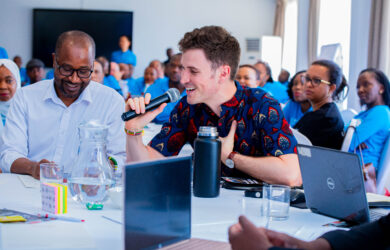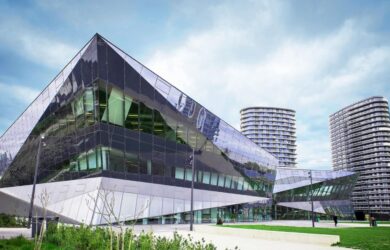
Oscar Espinoza Martin wants Oscar Espinoza Martin sees cultural heritage as a tool to encourage Indigenous people to exercise their citizens’ rights
I want to build Indigenous people's self esteem in order to encourage them to exercise their citizens’ rights in a country that has denied them their right to be heard and so that they can demand their right to speak out.
Oscar Espinoza Martin
Oscar Espinoza Martin [2024] sees archaeology and cultural heritage as tools for strengthening Indigenous people’s sense of citizenship.
“It is important how people feel about their past and how they navigate from there to the present,” he says.
As an Indigenous person growing up in Lima with an early interest in history and philosophy, he is very aware of the importance of understanding the past as a way of countering discrimination and injustice in the present. For the last 10 years, he has worked in Peru’s Ministry of Culture, most recently acting as a mediator between the state and the Indigenous people’s demands about their cultural heritage.
His MPhil in Heritage Studies, which he begins in the autumn, will involve using ethnographic data, archival research and statistics to study how heritage is a political platform where Andean communities and the Peruvian state negotiate particular agendas. By doing so, Oscar plans to shed light on the modernisation of the Peruvian state in the 20th century and periods of widespread state violence against Indigenous people, including 16th-century plunder and colonial appropriation.
He says: “There is a lot of misunderstanding about the history of Peru and a lack of self esteem among Indigenous communities due to the colonial legacy. I see that in the faces of Indigenous people I have worked with. They understand their own history in colonial terms. I want to build their self esteem in order to encourage them to exercise their citizens’ rights in a country that has denied them their right to be heard and so that they can demand their right to speak out.”
Background
Oscar grew up in Lima with his parents and sister in the middle of the armed conflict between the Peruvian government and Sendero Luminoso and the Túpac Amaru Revolutionary Movement. His parents were from two different Indigenous communities in the Peruvian highlands(Ranrash and Taucur) and had moved to Lima to raise a family and to work. Neither had completed their basic education. Oscar’s father sold sweets in the streets and his mother was a housewife.
The armed conflict meant Oscar’s early childhood was challenging. There were days when the electricity was cut off and Oscar recalls reading his first books by candlelight. It was also a time of economic crisis and his parents sometimes didn’t have enough money to buy bread and milk when Oscar was very young. By the time he started primary school, however, things were getting a little better.
Oscar became a class prefect (brigadier) at the age of eight. He was a very studious child who excelled at the humanities and social sciences. Instead of playing with friends, he would read or watch history documentaries. His interest in history and philosophy was ignited when his father bought him some books on the subjects and by a passionate history teacher, Mr Aldana. Oscar knew from early on that he wanted to study history or archaeology when he finished school.
He was aware of the disconnect between the history he was taught at school – which extolled Peru’s colonial roots, including the benefits of Christianity, technology and Spanish, as well as the country’s independence from Spain while remaining silent about the genocide of Indigenous peoples. That awareness fuelled his desire to do a different type of archaeology, mining Peru’s deeper past, in order to change the prevailing mindset.
Undergraduate degree and beyond
After school, he spent a year preparing for the admissions exam at San Marcos University, the oldest university in South America, and got the highest score in his class. He began his degree in Archaeology in 2007 and finished in 2014 because he had to extend it by two years as he was working in a supermarket to pay for a computer and books. His course consisted of theory and practice, including working at excavation sites such as an ancient colonial church in the Piura region.
In the final year and a half of his studies, Oscar did his professional practice in the Peruvian Navy. It was an unusual setting for an archaeologist. The Navy had a small museum of colonial monuments and objects, such as colonial vessels. Many of the objects had been under water and the Navy didn’t know how to preserve them. Oscar wrote a guide on the conservation process.
He then applied on graduation to join the Peruvian Ministry of Culture and has spent the last 10 years building his cultural heritage skills, working in three areas: on the Inca Road project; in the Cultural Landscape Directorate; and in the World Heritage Site Office. His work has ranged from facilitating workshops for children about heritage protection to working with Indigenous communities to improve their quality of life by protecting their cultural heritage, particularly archaeological sites and cultural landscapes. “One of my main achievements has been working with indigenous communities,” he says. “I define myself as being of indigenous descent so I have always had this need to do something for indigenous communities in my country and for my heritage.”
Advocacy
In 2017 he started to strongly advocate for the state to consult with Indigenous communities if it intended to enact laws that could compromise their collective rights. “I felt it was important to get their views and understand their concerns,” says Oscar. He worked on an area that the Peruvian state wanted to declare a National Cultural Heritage site. While the state argued that it could bring benefits to local communities, it also involved changes in decision-making about the land. So Oscar mediated between both stakeholders.
In the role he found himself caught between several different identities – as an employee, archaeologist and an Indigenous person. The main concern of the communities consulted was that their land would be taken away from them if it was declared a national heritage site, even though, according to international law, it belongs to them. In the end, the communities reaffirmed their land ownership by expressing their needs and concerns in public assemblies, strengthening their right to be heard in the public sphere.
He had always intended to further his academic studies and thought that would be in Latin America, but he found the master’s in Heritage Studies at the University of Cambridge and liked the way the university approached the subject through a critical, political lens which foregrounded indigenous rights, conflict and the climate crisis.
Oscar says he would not be able to do the MPhil without the Gates Cambridge scholarship and he is very proud to be the first scholar from his university. Indeed the university’s archaeology department arranged a party to celebrate his selection.
In the longer term Oscar is keen to set up an NGO to help guide Indigenous communities in how to use their cultural heritage to improve their lives. “That has always been my dream. It is uncommon for an archaeologist in my country to work closely with Indigenous people. As an NGO founder, I would be completely on their side,” he says.
*Top photo: Oscar at work with Andean communities












